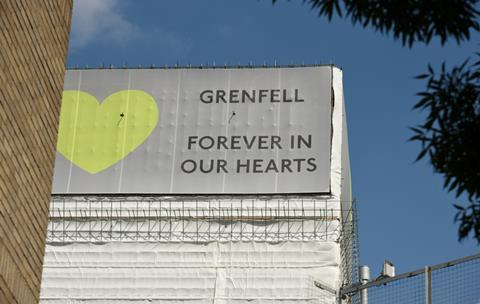The inquiry finds no additional recommendations needed beyond the changes made in the Social Housing (Regulation) Act
The Grenfell Inquiry has not issued specific recommendations for the regulation of social housing providers, despite acknowledging the “systemic failings” of the tenant management organisation and oversight failures by the Royal Borough of Kensington and Chelsea.

The inquiry’s final report critiques the way the TMO handled complaints, remedying defects identified in fire risk assessments, installing and maintaining fire protection systems and carried out routine inspection and maintenance of fire doors.
It says under different circumstances “shortcomings of those kinds would probably have led us to make a number of recommendations directed to ensuring that they were rectified and not repeated.”
However, the report states that due to the introduction of the Social Housing (Regulation) Act 2023, the inquiry does not find it necessary to make additional recommendations.
In particular, the report notes that the Social Housing (Regulation) Act can set standards for the competence and conduct of social housing managers and requires RPs to share information with tenants and the regulator.
The report also emphasises that the act prioritises safety by mandating landlords to address and fix health-impacting defects within a specified timeframe.
The report identified that the KCTMO’s fire risk assessor, Carl Stokes, was aware that the TMO was not completing remedial work within the recommended times.
However, none of Stokes’ fire risk assessments considered the risk posed to residents by the TMO’s longstanding failure to carry out remedial work in a timely manner.
A fire risk assessment produced by Salvus Consulting Limited found that monthly safety inspections did not include any formal checks on fire doors and recommended that the inspection sheet be revised to include fire door checks.
Head of fire safety enforcement at the London Fire Brigade (LFB), Andy Jack, suggested that checks on self-closing doors could be carried out when completing annual gas safety checks. The TMO did not reach an agreement on how they would go about maintaining self-closing devices, meaning they were not maintained.
The report notes that there was ”a long history going back to 2010” of fire safety complaints made by Grenfell Tower residents.
More broadly, a report commissioned by the Royal Borough of Kensington and Chelsea, written by Maria Memoli and published on 10 April 2009, made serious criticisms of the TMO’s relationship with tenants, leaseholders and freeholders, noting that it affected repairs, major works, management and service charges, and customer care, among other issues.
The report found that “complaints had not been resolved, it was felt, for some years”.
The TMO had a complaints policy from 2010 onwards, which was intended to be reviewed every three years. However, it was not reviewed until 2015, when it was revised by broadening the definition of a complaint and introducing a procedural hierarchy for different forms of communication from residents.
Despite this, some residents, including Shahid Ahmed, founder of the Grenfell Tower Leaseholders’ Association (GTLA) said he did not use the complaints procedure as he had “no faith” in it. The report noted that initially the concerns raised by the related to the reasonableness of services charges and the quality of services, but over time the TMO’s attitude to fire safety became a further concern.
In regard to fire safety planning for vulnerable residents, the report notes that the LFB had been concerned about the TMO’s failure to make adequate provision for disabled people to escape from some of its buildings since 2009.
More on the Grenfell Inquiry Phase 2 report
Grenfell Inquiry Phase 2 report: all our coverage in one place
Decades of central government failure led to Grenfell tragedy, says inquiry
Metropolitan Police chief stresses it could take 18 months to bring charges over Grenfell
KCTMO responsible for ‘systemic failings’ in fire safety management, Grenfell Inquiry finds
For instance, a fire risk assessment for Gillray House, a building managed by KCTMO, was deemed inadequate because it lacked procedures to ensure that occupants with reduced mobility could escape safely.
In addition, personal emergency evacuation plans (PEEPs) were not prepared for disabled residents in Grenfell Tower. Between 2010 to 2017, only two residents were assessed for PEEPs, one in Markland House and one in Gillray house.
Of the 297 people present in Grenfell Tower on the night of the fire, 67 were children and 37 were adults with sensory, mobility or cognitive impairments.
There were a further 17 residents who had a sensory, mobility or cognitive impairment that was not recorded in the tenancy records, tenancy audit documents or a spreadsheet that David Noble, former policy and diversity officer at KCTMO, had produced.
The report concluded that ”the TMO’s failure to collect such information illustrates a basic neglect of its obligations in relation to fire safety.”











No comments yet